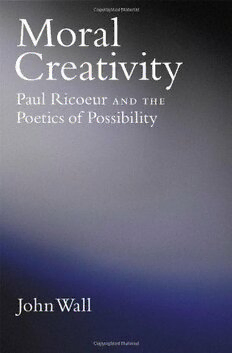Download Moral Creativity: Paul Ricoeur and the Poetics of Possibility PDF Free - Full Version
Download Moral Creativity: Paul Ricoeur and the Poetics of Possibility by John Wall in PDF format completely FREE. No registration required, no payment needed. Get instant access to this valuable resource on PDFdrive.to!
About Moral Creativity: Paul Ricoeur and the Poetics of Possibility
In Moral Creativity, John Wall argues that moral life and thought are inherently and radically creative. Human beings are called by their own primordially created depths to exceed historical evil and tragedy through the ongoing creative transformation of their world. This thesis challenges ancient Greek and biblical separations of ethics and poetic image-making, as well as contemporary conceptions of moral life as grounded in abstract principles or preconstituted traditions. Taking as his point of departure the poetics of the will of Paul Ricoeur, and ranging widely into critical conversations with Continental, narrative, feminist, and liberationist ethics, Wall uncovers the profound senses in which moral practice and thought involve tension, catharsis, excess, and renewal. In the process, he draws new connections between sin and tragedy, practice and poetics, and morality and myth. Rather than proposing a complete ethics, Moral Creativity is a meta-ethical work investigating the creative capability as part of what it means, morally, to be human. This capability is explored around four dimensions of ontology, teleology, deontology, and social practice. In each case, Wall examines a traditional perspective on the relation of ethics to poetics, critiques it using resources from contemporary phenomenology, and develops a conception of a more original poetics of moral life. In the end, moral creativity is a human capability for inhabiting tensions among others and in social systems and, in the image of a Creator, creating together an ever more radically inclusive moral world.
Detailed Information
| Author: | John Wall |
|---|---|
| Publication Year: | 2005 |
| ISBN: | 9780195182569 |
| Pages: | 245 |
| Language: | English |
| File Size: | 2.03 |
| Format: | |
| Price: | FREE |
Safe & Secure Download - No registration required
Why Choose PDFdrive for Your Free Moral Creativity: Paul Ricoeur and the Poetics of Possibility Download?
- 100% Free: No hidden fees or subscriptions required for one book every day.
- No Registration: Immediate access is available without creating accounts for one book every day.
- Safe and Secure: Clean downloads without malware or viruses
- Multiple Formats: PDF, MOBI, Mpub,... optimized for all devices
- Educational Resource: Supporting knowledge sharing and learning
Frequently Asked Questions
Is it really free to download Moral Creativity: Paul Ricoeur and the Poetics of Possibility PDF?
Yes, on https://PDFdrive.to you can download Moral Creativity: Paul Ricoeur and the Poetics of Possibility by John Wall completely free. We don't require any payment, subscription, or registration to access this PDF file. For 3 books every day.
How can I read Moral Creativity: Paul Ricoeur and the Poetics of Possibility on my mobile device?
After downloading Moral Creativity: Paul Ricoeur and the Poetics of Possibility PDF, you can open it with any PDF reader app on your phone or tablet. We recommend using Adobe Acrobat Reader, Apple Books, or Google Play Books for the best reading experience.
Is this the full version of Moral Creativity: Paul Ricoeur and the Poetics of Possibility?
Yes, this is the complete PDF version of Moral Creativity: Paul Ricoeur and the Poetics of Possibility by John Wall. You will be able to read the entire content as in the printed version without missing any pages.
Is it legal to download Moral Creativity: Paul Ricoeur and the Poetics of Possibility PDF for free?
https://PDFdrive.to provides links to free educational resources available online. We do not store any files on our servers. Please be aware of copyright laws in your country before downloading.
The materials shared are intended for research, educational, and personal use in accordance with fair use principles.

